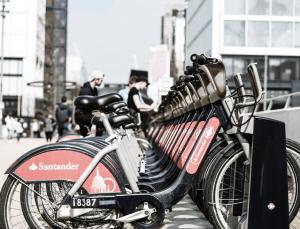
London, as one of the most beautiful and diverse cities in the world. It’s a great destination to intern, but the cost of living there is particularly high. According to Expatistan, London is ranked among the most expensive cities in the world. At first, it might seem challenging to live here but trust us. It can be done, and you can have lots of fun new experiences doing so. Budgeting is a way to ensure you don’t spend all your savings while interning.
This is why we decided to give insight on how to reduce your living costs to a minimum – so you can not only thrive in London but also be able to create a savings account, treat yourself and have lots of fun! To demonstrate, we are creating a hypothetical case study using a budget of £1500 per month. Scroll down to see how you can thrive in London without breaking the bank.

Photo by Christian Erfurt
Step 1: Cheap accommodation prices and the right area

Photo by Yasmine Boheas
Your starting point is to hunt for room prices, taking into consideration that a single room costs around £400–£600 per month, whereas a double can be at least £600–£900. It is best to do your research into what areas in London are affordable for you. Find areas with an average price that you can afford and be thorough with your search there. Checking London’s newspapers online and housing websites like Spotahome are your first tool when chasing the best price in accommodation.
Next step…
When you find a place that you like, always speak with the landlord first. Ensure the rooms are furnished. Always try to view the property before committing. See if there are any friends or family that can host you for a couple of weeks while you settle into the country and view properties (if this is not an option, then try to have a virtual meeting with different landlords so they can show you the place) or stay in an Airbnb for a few days before making the commitment.
For the sake of our case study, let’s say you’ve found a double room with bills included and a shared restroom for £700 per month. Our remaining budget is now £800. Now, let’s talk about food!
Step 2: Food
 Photo by Tom Grünbauer
Photo by Tom Grünbauer
There are many street markets such as Whitechapel Market or Lewisham Market. They all offer a great choice for a small price, making these your go-to options. Go and find your local street market and compare its prices with the ones from the local supermarket. You can also get great deals from these markets in the evenings, just before they wrap up for the day.
If you are the type of person who likes to buy their food in a supermarket, we have a series of tips that can help you reduce your bills when you buy groceries.
Compare Pricing:
Check prices in all the supermarkets around you, since the prices among local shops could vary widely. Find a shop near you that offers the lowest price and do your grocery shopping there.
Shop with your head, not your stomach:
You’ll more likely buy for cravings. To help yourself keep track, make a shopping list and stick to it.
Shop supermarket brand:
Most supermarkets have their own-brand items, which are often the same quality as branded items but often less than half the price.
Buy in bulk:
Try to buy and store non-perishable items in large amounts, as it will often save you money in the long run. This includes things like rice, pasta, frozen items (if you have the freezer space), and cleaning products. This can be combined with a lookout for multi-buy offers.
Meal prep:
Cook lunch and dinner for the week ahead on a Sunday evening and store it in portioned containers. This is so that during the week, you don’t become tempted to buy out after your day’s work when you don’t want to cook. Cooking in bulk saves time, and it’s cheaper and healthier than the store-bought stuff. This is a key component in a healthy lifestyle if that is something important to you.
For our case study, we will estimate you spending about £150 per month on groceries from a combination of supermarkets and street markets. This will take our leftover budget of £800 to £650.
Step 3: Transportation

Photo by Joseph Balzano
There are different forms of transportation in London. Some are pricier than others, but we’ll cover a lot of ground. That way you can have more than one option when choosing how to get around the city.
London Underground, known as the tube:
The tube is a fast way to travel, but it can be a little pricey.
Travelcard:
Getting a London travel card is pivotal, but which card should you get? For those that don’t travel around that much, the best option to get is a pay-as-you-go card; for those who do (at least 3 times a day, 5 days a week) a weekly or monthly travel card is better and cheaper.
Public Transportation is run by Transport for London, which means that you can travel the length and breadth of the city either overground or the underground. The cost of the monthly pass is around £150 per month, though it does depend on which zones you will be covered in your travel pass. This price is based on the assumption that you live in Zone 3 and you work in Zone 1.
Off-peak tickets:
Travelling in off-peak times can be a good way to save up some money from time to time. It is worth highlighting that travelling during off-peak time within Zones 2-6 is capped at £1.50 one way. Off-peak times are from Monday-Friday starting after 9:30 am and again after 7:00 pm. Additionally, you can see if you can start work at a later time. Ask your employer if you could start around 10 am and leave the office at about 7:00 pm if you’re wanting to avoid off-peak hours.
If using the tube is too expensive for you and you want to be a little more physically active, why not ride to work?

Photo by Melissa Walker Horn
Renting a bike:
For those that don’t have the room to store their bikes, Santander Cycles might be the perfect fit. Dotted in hundreds of locations around the city, the bikes require £2 to use for 1-day use – though riding for more than 30 minutes will cost £1 extra, over 1 hour an extra £4, and so on. Try cycling for no more than half an hour at a time if you don’t want to get extra charges. That way, you’ll be able to cycle anywhere in London for an entire day, for only £2!
For Frequent Riders…
There are also year-passes for frequent riders and that can be a good way to save money. There are dedicated cycle lanes on most major roads in London. If you do have the room to store a bicycle, you can buy one second-hand for as little as £50 – which amounts to a larger upfront cost, but you’ll spend less on commuting afterwards. However, it would be nice to check if there are showers at the workplace to start work fresh and clean. Let’s move on to road travel.
Ride the bus:
The good thing about having an Oyster card is that you too can take advantage of using the bus. A bus can be very convenient to use as an intern. On pay-as-you-go on Oyster, bus fares are capped at £1.50. People can change buses once as well, so if they have to take 2 buses to work, it will still only cost £1.50. Buses are very popular and frequent, and it is a great way to see the city because it has many routes that can take you to iconic places. This might be a nice change of pace compared to the tube, where there is nothing to see. We note that the bus can be just as busy as the tube though, so you may not always get a seat at first.
Try walking for a bit:
A free form of transportation, beneficial for your health and overall well-being. The downside is that walking is very time-consuming and, depending on the distance, you might have to get up early in the morning to get to work on time.
If you chose the monthly pass, this costs around £150 per month, so the budget is now £500. If you chose to rent a bicycle at £48 per month (which covers 24 days per month, at £2 per day), your budget will now be £602. And if you are a foot soldier, you should still have £650.
For the purposes of this case study, we will continue with the monthly tube pass.
Step 4: Entertainment

Photo by Regina Victorica
This is the category where you have the most varieties, as there are many things that a person can do for free in London for leisure. All around you have museums, monuments, parks, activities, festivals, and screenings. These are a few examples of places you can visit if you have some time to spare and don’t want to stay home.
The Science Museum:
The highly interesting and entertaining Science Museum has seven floors with interactive exhibits. In the Energy Hall, there is an exhibit of the first steam locomotives, dating from the early 19th century. Make sure you don’t miss out on the third-floor exhibits, which include old gliders, hot-air balloons, and flight simulators. Also, entry is free, though donations are welcome and appreciated!

London Science Museum
Stroll through a park:
You can visit Kensington Gardens, which are home to a trove of treasures, including the Albert Memorial, the Peter Pan statue, the Serpentine Gallery, the Round Pond, and the Diana Memorial Playground. All are free to admire, and when you’re done with the sights, you can wander along the tree-lined paths which crisscross the whole park. There’s a soiree of Royal Parks East and North of there, all free to enter: Hyde Park, Regent’s Park, St. James’ Park and Green Park.
Go to the movies:
For those people who are artsy, there are free screenings all round London, waiting to be found. If that’s not enough for you, there are dozens of really inexpensive cinemas such as the Prince Charles Cinema, where you can see all their films for just £4-6 after you pay an annual fee of £10! Alternatively, the Barbican, the Coronet Cinema, and Richmix are all cinemas located in Tower Hamlet, which offer a huge range of films on certain days, for anywhere between £4-7!
Lots of views:
There are plenty of skyscrapers which have restaurants or bars you can visit for free to enjoy a great view, like the Aquashard or Hutong at the Shard. You don’t necessarily have to dine there to visit, just go there to enjoy the view for free and leave afterwards.
Visit the Royal Parks:
They are open to the public and are 100% for free 24/7.
Window-shopping:
There are many stores and malls you can visit which have some of the biggest brands in the world. A nice way to spend a day can be to go to an iconic merchant street and look at some of the things they have.
If you budget £70 per month for entertainment, like a music concert or an annual fee for cinema tickets, then your budget will now be £430.
Step 5: Eating out

Photo by Melissa Walker Horn
For people who love cuisine and can’t live without going out for food, waiting for discount specials is essential, and make sure you always check the price before you eat somewhere. Websites like Groupon or Voucher Codes are especially helpful for ensuring you’ve got the best price.
Book your meal online:
This means you can save a bit if you plan in advance, as opposed to just showing up at a restaurant. There are sites like Opentable or Firsttable which allow you to earn points for booking online through them. Earn enough points, and you can get different prices and possibly even a free meal. Besides, on these websites, the restaurants offer up to 50% or set menus at a discount. If you feel tired after a long day of work and don’t want to cook, apps like Too Good To Go allow you to buy heavily discounted food from local restaurants and cafes that are about to close, since that food would have otherwise gone to the bin. This is a tasty way to help the environment and reduce waste!
Eat for free as a Mystery Shopper:
Mystery dining is another good way to find cheap meals. All you have to do is register as a Mystery Shopper with the Market Force or Mystery Dining by HGEM. You will get assignments to try out restaurants in London, then not only will you be compensated for the money spent on the meal, but you will also get a little extra for your troubles. Free food with a paycheque, probably one of the best ways to eat in London.
Try a promotion period from Food Tech Companies:
Food tech companies such as Gousto, HelloFresh and Mindful Chef have great introductory offers. During a promo period, they all deliver food to your doorstep for the same price as buying directly from the supermarket. You can decide whether you would like to keep the subscription at the full price after the 3-4 week promo offer. You can cancel after the trial period and try with another competitor, so you’ll get plenty of bites without breaking the piggy bank.
If you budget £60 for eating out each month, then our new budget would be £370.
Step 6: Working out

Photo by Danielle Cerullo
If going to the gym is a must for you there are many options to choose from while in London.
-
Free gym trials:
Many gyms offer a trial period like classpass or deals to pay by day or week. This may be more expensive per session than a contract, but if you’re only there once a week, it will save you a lot in the long run.
-
No frills gyms:
There is an increasing number of “no-frills gyms”. From £12.99 a month, this type of gym simply offers the basics of a gym membership.
-
Free sports activities:
Several companies offer free exercise and sport around the city. For a free gym experience, The Great Outdoor Gym has free outdoor gym equipment located all around London, ready and set up to use. All you have to do is go on their website to find them, and start working out whenever you like! Tennis for Free also has free courts around London. Finally, there are plenty of free yoga classes as well as free dance classes across London.
Since a gym membership will average around £24 a month, our budget would now be £346. Of course, if you choose to do a series of free workouts or tried out several different gym membership trials for free, then your budget would still be around £370.
Step 6: Reduce your phone data

Photo by Jonas Lee
There are ways to keep your mobile phone bill as low as possible. Instead of going to popular networks like EE, Vodafone, or O2, go to smaller networks that offer exceptional deals like GiffGaff. If you would like to keep in touch with friends and family back home, Lyca and Lebara both offer great packages with data, minutes and international minutes to call abroad. Now, this is not always guaranteed, but it always worth a shot. You may even get your phone bill as low as £20 per month.
Ask yourself: Do you need all the data and minutes offered by a network for that expensive package?
Assuming you’ve scored lowering your phone bill to £20 a month, then your final monthly budget would be around £326.
Final Thoughts
This is a small guideline of some tips and tricks to budgeting in London. Remember that there are other things you can use to reduce your expenses, such as free trials, coupons, vouchers, special discounts, and offers. After living in London for a few weeks or a month, you can take action and ask your landlord about the possibility of sharing your one room with a roommate, so that you can halve your expenses.
Lastly…
Remember that it is vital to keep an expenses plan at the beginning of each month and check it regularly to ensure that your budget still follows that plan. It’s important to write everything down as you plan, e.g. if you like to eat snacks, make sure to write that into your regular grocery shopping list, or even take this time in London as an opportunity to learn how to make more food yourself so you can save some money.
Other things you can do to customize your budget plan are researching more and asking a local friend for insight. At the end of the month, you’ll have money to spare and save if you feel like it.
Related Articles



